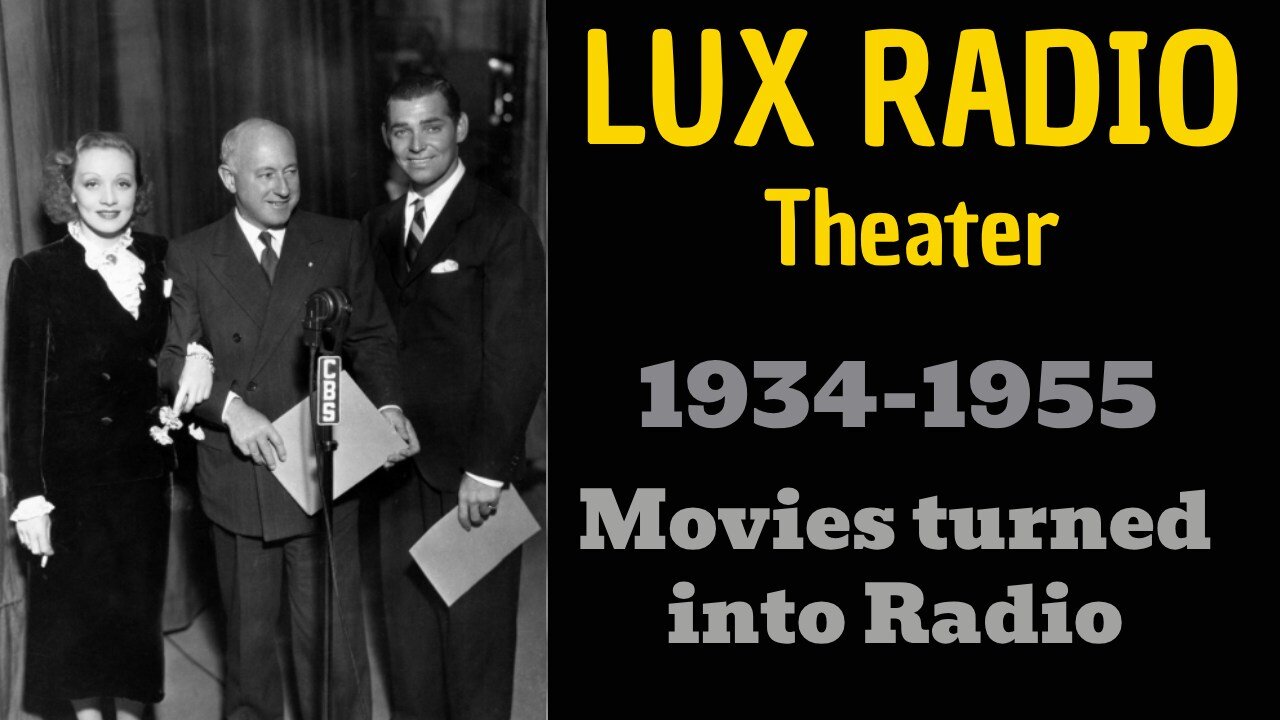Premium Only Content

Lux Radio 39/05/08 (ep218) The Life of Emile Zola (Paul Muni, Josephine Hutchinson)
Plot
Set in the mid through late 19th century, the film depicts Émile Zola's early friendship with post-Impressionist painter Paul Cézanne and his rise to fame through his prolific writing. It also explores his involvement late in the Dreyfus affair.
In 1862 Paris, struggling writer Zola shares a drafty Paris attic with Cézanne. His fiancée Alexandrine procures him a desk clerk job at a bookshop, but he is soon fired after he arouses the ire of his employer and an agent of police with his provocative novel The Confessions of Claude. He then witnesses many injustices in French society, such as a crowded river slum, unlawful mining conditions and corruption in the army and government. Finally, a chance encounter with a street prostitute hiding from a police raid inspires his first bestseller, Nana, an exposé of the steamy underside of Parisian life. Lux Radio Theatre was indisputably the biggest, most important, most expensive drama anthology program on radio. It ran from October 14, 1934 until June 7, 1955, then continued on television as Lux Video Theatre until 1957. In all, some 926 episodes were broadcast, providing a record of the most important entertainment events in American theatre and, later, film.
The show was first broadcast on the NBC Blue Network on Sundays at 2:30 PM. The show featured adaptations of successful Broadway plays when it was produced out of New York, such as Seventh Heaven, the first production starring Miriam Hopkins, Smilin' Through, Berkeley Square, Daddy Long Legs, Peg O' My Heart and Way Down East. On July 29, 1935, the show moved to Monday night at 9:00 PM on CBS, where it would stay until June 29, 1954. The show moved to Hollywood on May 25, 1936 with the production of The Legionnaire and the Lady, based on the film Morocco, starring Marlene Dietrich and Clark Gable. The audience for this production was estimated as high as 40 million. The show featured many of the most important films of the period, adapted to fit the 60 minute time slot. Some of the titles for 1939 should indicate the caliber and range of shows: Stage Door, Ceiling Zero, So Big, It Happened One Night, The Lives of a Bengal Lancer, Lady for a Day, The Life of Emile Zola, Tovarich, Only Angels Have Wings, The Prisoner of Zenda, The Awful Truth, Wuthering Heights, You Can't Take It With You, The Old Maid and Goodbye, Mr Chips. For its last season, (1954-1955), the show moved to Tuesday nights at 9 on NBC.
Lux Radio Theatre was always broadcast live, with a studio audience and a full orchestra accompanying the performance and providing musical transitions between scenes. As many film actors were used to numerous takes and not live performance, they sometimes suffered acute stage fright before the show. However, since most received $5,000 for their performance -- in addition to free publicity for upcoming pictures -- actors appeared in their original screen roles if they were available. Indeed, production would halt if necessary, on a film if performers were called to appear on Lux. When the actors were not available, others stepped in. The plays were assembled and rehearsed for a week, in sharp contrast to many other shows, which required a minimal of an actor's time. Regular players for the series included Jim and Marian Jordan, otherwise known as Fibber McGee and Molly. Hosts included Cecil B. DeMille (1936-1945), William Keighley (1945-1952) and Irving Cummings (1952-1955). Directors included Tony Stanford, Frank Woodruff, Fred MacKaye and Earl Ebi.
-
 LIVE
LIVE
Steven Crowder
2 hours ago🔴 There is No Trump Buyer's Remorse; Why the New Poll Numbers are a Psyop
84,876 watching -
 LIVE
LIVE
The Rubin Report
1 hour agoCNN Panel Clashes Over Kash Patel’s Aggressive Move That Some Say Goes Too Far
3,201 watching -
 UPCOMING
UPCOMING
Nerdrotic
5 hours agoNerdrotic Nooner 482
3.38K1 -
 UPCOMING
UPCOMING
The Shannon Joy Show
1 hour ago🔥🔥Radical American Independence - The Most Controversial Political Position In America Is To Fully Reject BOTH Political Parties. Are You Ready To Emancipate?🔥🔥
99 -
 LIVE
LIVE
Benny Johnson
1 hour agoDark TRUTH About Deadly DC Crash REVEALED: Female Army Pilot REFUSED Orders! 'Intentional'
6,794 watching -
 LIVE
LIVE
The Big Mig™
4 hours agoAutoPenGate Lock Em Up, Arrests Coming!
5,392 watching -
 UPCOMING
UPCOMING
Grant Stinchfield
14 minutes agoLAPD Fails to Release the Most Important Video of the Police Shooting of a Rock Star Wife
-
 1:00:39
1:00:39
VINCE
3 hours agoThe Mass Deportations Have Begun | Episode 31 - 04/28/25
167K106 -
 LIVE
LIVE
LFA TV
14 hours agoALL DAY LIVE STREAM - 4/28/25
4,174 watching -
 UPCOMING
UPCOMING
Vaxxchoice
19 hours agoYour News with Sam Anthony
316